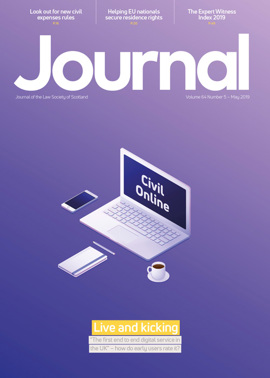3% – and then what?

So here we are. At long last we have arrived at a day which, frankly, I had given up all hope of seeing. A day when legal aid rates were increased.
Without wishing to detract from the good work of Alison Atack, current President of the Law Society of Scotland, and her immediate forebears, I incline to the view that the current Cabinet Secretary Humza Yousaf and his colleague Ash Denham, when looking at the numbers, were inevitably of the view that to ignore the need for action would be not only politically unjustifiable but personally embarrassing.
There was once a link between legal aid rates and the payment solicitors could expect from fee paying clients. A link, but nothing like parity. The profession acknowledged that with “certainty of payment” and a third party paying for the client’s case, a healthy discount would apply. Legal aid rates were, however, to be kept under review. Until 1992 that happened. Not merely last century, but 27 years ago, that all stopped.
27 years of decline
I was a young solicitor in 1992, about to establish my own firm. I remember colleagues commenting on the courage that was required to commit to the ever increasing overheads of premises and staff in the context of a legal aid funding model. Little did I know that more than two decades later I would be operating in an economic environment that, so far as legal aid income was concerned, hadn’t improved.
Of course, there have been changes before our new increase, but they have meant little. The move to fixed or block payments in both civil and criminal cases was supposed to make things easier for the solicitor and reduce administration for the Scottish Legal Aid Board. In civil cases the blocks often mask the detail of work that is required in difficult cases and by demanding clients (or their opponents), and in criminal cases the disposal fee in summary cases, which rewarded the solicitor for resolving a case early, was nothing compared to the system savings it created.
The promised reinvestment of such savings into the legal aid spend did not materialise. For solemn crime in the sheriff and High Courts, the supposed increase in fees which arrived with peer review was more promised than real; rather than look at revisiting the rates to be sure that the increase had been achieved, solemn fees were first cut so as to share funding across unfunded areas, and subsequently criminal fee cuts were agreed in terms of austerity and to protect against the wholesale rollout of the public defence solicitor. Bearing in mind the eagerness of SLAB to abate solicitors’ accounts as well as the strict(ly short) time limits for submitting accounts, the concept of certainty of payment is not exactly bankable.
A turnaround?
As of 26 April the base legal aid rate for work carried out by a solicitor (travel) increases from £21.10 per hour to £21.76 (£24.20 to £25.16 in solemn cases). Office work increases from £42.20 to £43.48 (solemn: £48.80 to £50.28) and advocacy from £54.80 to £56.46 (solemn: £73.20 to £75.40). In the rare instances when a non-solicitor member of staff carries out chargeable work, they generate income at an average of about £24 per hour, unless taking a witness statement in a solemn case when it is £11.90 per hour. And remember, these aren’t the rates of pay the staff member receives, they are contributions to firm turnover from which overheads must be met before the partners can share any profit. The 3% increase still leaves the profession 106.5% behind in real terms. So by RPI alone, and without any weighting for the increases in the technical or evidential difficulty of cases across almost 30 years, rates should be more than double the “new” rates.
The Scottish Government has, however, promised more than just the 3% increase, and a working party has been established to decide how, in future, the rates will be reviewed. Here’s an idea – unless there is a real willingness to let the profession catch up on lost ground, why not just commit to annual increases in line with inflation? Something which has in fact applied to the charge rates of sheriff officers. Wouldn’t that save a lot of time and trouble? And if my scepticism about the will to repair the funding shortfall is misplaced, I could be proved wrong simply by the Government reversing the cuts of 2011.
The truth is that Government funding for those who cannot pay for a solicitor is a necessary condition to maintaining access to justice and the rule of law. It is essential in a civilised society. Funding of legal aid is not a cost to society, it is an investment in our society and one which pays a substantial dividend. The time has passed when it can be expected that privately funded work can appropriately subsidise the legal aid sector. I can only hope that is now being recognised.
In this issue
- Claiming under the advance payment scheme
- Time for a written constitution
- New form F9: worth the wait?
- Wedded to a matrimonial property regime
- Brexit divorce set to increase UK's “skype families”
- Corporate personality: Justice v Doctrine
- Reading for pleasure
- The Law Society of Scotland Expert Witness Index 2019
- Opinion: Judith Robertson
- Book reviews
- Profile: Michael Clancy
- President's column
- Is your legal data being held to ransom?
- People on the move
- Sign up – log in – action!
- Frozen out?
- Taxing times for litigators
- DNA analysis: when research just isn’t enough
- Brexit focus: EU citizen settlement remedies
- Why employers should report on wellbeing
- 3% – and then what?
- 1,000 days of mediation
- Barred from acting
- To name or not to name?
- Enter the “What I Think”
- Fixed penalties and fair trials
- Auto-enrolment: keeping employers on their toes
- Scottish Solicitors' Discipline Tribunal
- Vulnerable accused: a need for knowledge
- Burdens and who can enforce them
- Convener’s final bow
- Public policy highlights
- TCSP review update
- Westminster: answering the call
- Accredited paralegal practice area highlight: family law
- Accredited Paralegal Committee profile
- Nyona named star paralegal
- Ask Ash
- Moving nightmares part 2
- Complaints: seeking consistent practice
- Morally bankrupt?
- For the elderly: how SFE works
- Standing up to challenge






